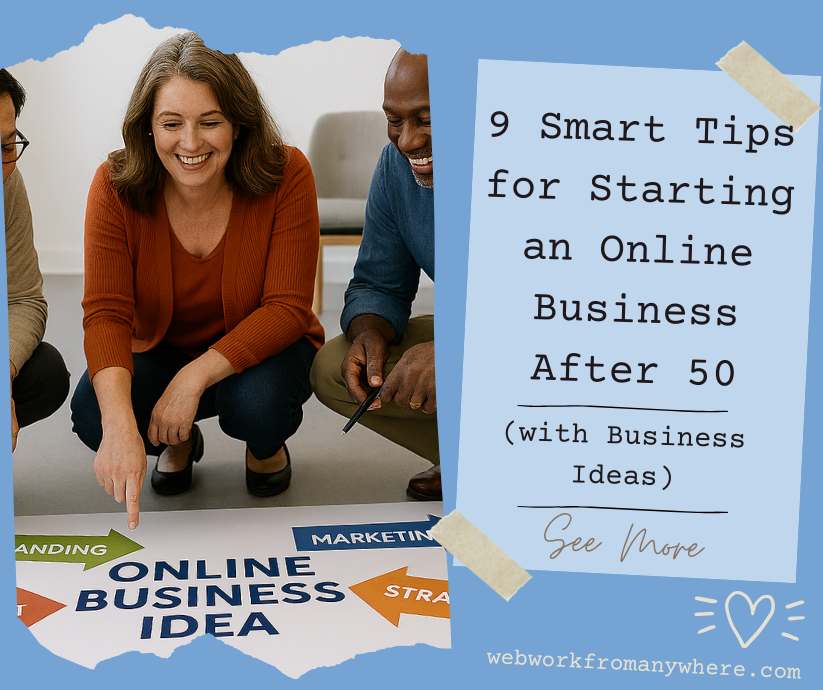Dreaming of starting a small online business but feeling completely overwhelmed? You’re not alone. There’s so much advice, so many options, and frankly, it’s hard to know where to begin. You don’t want to waste precious time or fall for scams. Here’s the good news: with the right approach and clarity, you can cut through the noise and build something meaningful that actually works. Starting an Online Business After 50 is easier than you think…
- 1. What Type of Online Business Should I Start?
- 2. How Do I Choose My Niche?
- 3. Who Exactly Is My Audience?
- 5. How Do I Avoid Common Beginner Mistakes?
- 6. How Can I Stay Motivated When Things Get Tough?
- 7. What Resources and Research Should I Use?
- 8. What Makes an Offer Actually Work?
- 9. Can I Really Build Something Scalable Without Huge Costs?
1. What Type of Online Business Should I Start?
The first step is understanding what’s out there. You’ve got options – and that’s both exciting and a little daunting.
Popular Business Models to Consider
- Affiliate marketing: Recommend products and earn a commission when people buy through your links
- E-commerce: Sell physical products through your own online store
- Dropshipping: Sell products without holding inventory – suppliers ship directly to customers
- Print-on-demand: Create custom designs for t-shirts, mugs, or other items with no upfront inventory costs
- Blogging: Share your expertise and monetize through ads, sponsorships, or selling your own products
- Teach Hobbies: Create online courses or workshops to share your skills on platforms like YouTube, Skillshare or Udemy.
Each model has its strengths. The key is choosing one that matches your interests, skills, and lifestyle. Don’t overthink it – you can always pivot later.
2. How Do I Choose My Niche?
Here’s where people get stuck. “Choose a niche” sounds simple, but what does it actually mean?
a) Start with What You Know and Care About
Think about what genuinely interests you. What could you talk about for hours? What problems have you solved in your own life?
Your niche sits at the intersection of your passion, your knowledge, and what people actually need.
b) Make It Specific
Instead of “health,” think “meal planning for busy professionals.” Instead of “gardening,” consider “small-space vegetable gardens for apartment dwellers.”
The more specific you are, the easier it becomes to stand out and attract the right people.
Action tip: List five topics you’re interested in. Then ask yourself: Who specifically would benefit from my knowledge here? What problem could I help them solve?

3. Who Exactly Is My Audience?
This might be the most important question you’ll answer when you’re starting an online business after 50. You’re not selling to everyone – you’re selling to someone very specific.
Get Crystal Clear on Your Ideal Customer
- What keeps them awake at night?
- What are they struggling with right now?
- Where do they hang out online? (Facebook groups? Instagram? LinkedIn? Reddit?)
- What language do they use when talking about their problems?
When you know your audience intimately, everything else – your marketing, your content, your products – becomes so much easier to create.
Action tip: Create a simple profile of your ideal customer. Give them a name, describe their daily challenges, and note where they spend time online.
This person should guide every business decision you make.
4. What’s the Barrier to Entry?
This means how hard or costly it is to start a business. So, check your startup costs before diving in.
Most online businesses only need a domain ($10–$15/year), hosting ($5–$10/month), and basic tools.
Avoid ideas that require expensive inventory, specialized equipment, or complex software. Aim to start for under $100 if possible.
5. How Do I Avoid Common Beginner Mistakes?
You’re going to make mistakes – everyone does. But you can sidestep the biggest ones with a little awareness.
a) Don’t Get Stuck on Being Original
Don’t reinvent the wheel. Study successful businesses in your niche and model their strategies. Adapt what works for you – don’t copy them exactly.
b) Start Before You’re “Ready”
Perfectionism is the enemy of progress. Your first website doesn’t need to be flawless. Your first product doesn’t need every bell and whistle.
Launch something simple, get feedback, and improve as you go. Waiting for everything to be perfect is just another form of procrastination.
c) Don’t Spend Money You Don’t Have
Choose a business model with low startup costs. You don’t need expensive software, fancy branding, or paid ads right away. Start lean, prove your concept works, then reinvest your profits.
d) Focus on One Thing at a Time
It’s tempting to try everything at once – blogging, social media, email marketing, paid ads. Instead, pick one platform or strategy, master it, then expand. Spreading yourself too thin leads to burnout.
Action tip: For your first 90 days, commit to one primary marketing channel. Go deep, not wide.
6. How Can I Stay Motivated When Things Get Tough?
Starting a business is a marathon, not a sprint. Some days will feel amazing; others will test your resolve.
a) Connect with Your “Why”
Why are you doing this? Is it financial freedom? More time with family? Creative expression? Write down your reasons and revisit them when motivation dips.
b) Find Your People
Don’t go it alone. Network with other small online business owners. Join Facebook groups, attend virtual meetups, follow inspiring creators on social media.
A supportive community makes all the difference.
Action tip: Find three Facebook groups or online communities in your niche this week. Introduce yourself and start engaging. Real connections lead to real support (and potential partnerships).
7. What Resources and Research Should I Use?
You don’t need a business degree – you need the right information and a willingness to learn.
a) Do Your Market Research First
Before investing time or money, validate your idea:
- Ask questions on Quora and Reddit related to your niche
- Search Facebook groups to see what people are struggling with
- Look for gaps in the market—problems people have that aren’t being well-solved
- Use AI tools like ChatGPT to brainstorm business ideas and refine your approach
b) Learn Skills Fast (Without Going Broke)
YouTube is your best friend. Need to build a website? Learn email marketing? Create social media graphics? There’s a free tutorial for that.
And if you can’t (or don’t want to) learn something yourself, outsource it affordably on platforms like Fiverr or Upwork.
Action tip: Spend one hour this week researching your target market on Reddit or Quora. What questions keep coming up? Those questions are your business opportunities.
8. What Makes an Offer Actually Work?
Your offer needs to be three things: clear, urgent, and solve something real.
a) Make It Obvious What You’re Selling
Don’t make people guess. If you’re selling meal plans for busy parents, say exactly that.
If you’re offering social media coaching for small businesses, spell it out in simple language.
b) Create Real Urgency
Why should someone buy now instead of later? Maybe you’re offering limited spots, early-bird pricing, or a bonus that expires.
Urgency doesn’t mean manipulation – it means giving people a compelling reason to take action today.
c) Solve Actual Problems
This is non-negotiable. If your product or service genuinely helps people, success will follow.
Focus on the transformation you provide, not just the features.
Action tip: Write out your offer in one sentence: “I help [specific audience] achieve [specific result] through [your solution].” If you can’t do this clearly, refine your offer until you can.
Bonus Tip: Address Objections and Make Buying Easy
Anticipate people’s concerns: “Is this for me?” “Will it work?” “What if I fail?” Answer these upfront in your sales copy or weave them naturally throughout content.
Then remove friction – simple checkout, clear instructions, testimonials, money-back guarantees. Make saying “yes” feel safe, obvious, and irresistible.
9. Can I Really Build Something Scalable Without Huge Costs?
Absolutely. Scalability isn’t about spending more or doing more – it’s about working smarter.
a) Choose High-Value Products or Services
Would you rather sell 100 items at $10 each or 10 items at $100 each? Both equal $1,000, but one requires far less effort. Don’t be afraid to sell premium offerings if you’re providing real value.
b) Leverage Other People’s Expertise
You don’t need to be good at everything. Platforms like Fiverr and Upwork let you hire talented people affordably for tasks you can’t (or don’t want to) do yourself – whether that’s graphic design, copywriting, website development, or video editing.
Here’s the key: Don’t hire the first person you find. Interview at least five candidates for each role.
Ask questions like: What’s your process? Can you show me similar work you’ve done? What’s your turnaround time? How do you handle revisions? The right hire will save you time and frustration; the wrong one can cost you both.
c) Build Systems That Work for You
As your business grows, automate repetitive tasks. Use email autoresponders, scheduling tools, and templates. Your time is valuable – spend it on what only you can do.
Action tip: Identify one task you’re currently doing manually that could be automated or outsourced. Take steps this week to make that change.
Wrapping Up: Starting an Online Business After 50
You’ve got the knowledge. You’ve got the ideas. Now it comes down to taking that first step – imperfect, uncertain, but forward. Starting an online business isn’t just about money; it’s about creating something meaningful on your terms.
The learning curve is real, but so is the reward. Ready to explore more strategies and discover more? Keep reading, keep learning, and most importantly – keep moving forward.
➔ See the Beginners Guide – Start Your Online Business and also…
➔ Why not Take the Quiz and see what business idea might suit you!







